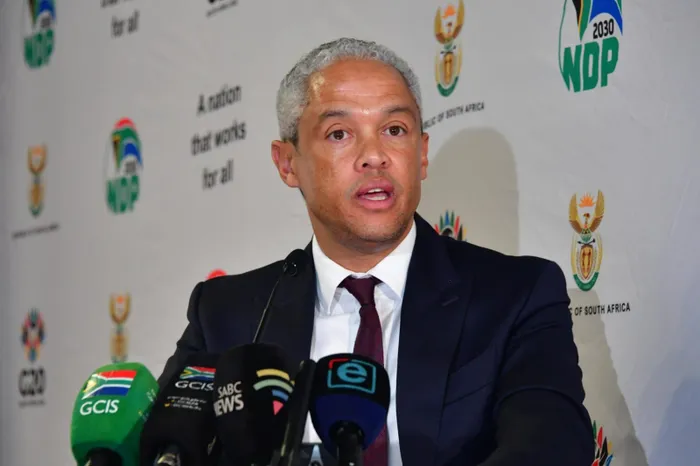
National Treasury director-general Duncan Pieterse says work on spending reviews has just started, along with the work around conditional grants review in infrastructure and the ghost worker audit.
Image: Supplied
National Treasury director-general Duncan Pieterse said the work to be done by his department on spending reviews will soon be presented before the Cabinet.
Pieterse said there were historical spending reviews and that they have embarked on a new wave of them.
“Some of the new spending reviews are complete, like the work on active labour market programmes and public employment, and that we will be tabling to Cabinet and elsewhere soon,” he said.
He made the statement along with Finance Minister Enoch Godongwana and the National Treasury team unpacking the 2025/26 Budget on Friday.
In his Budget speech, Godongwana said the National Treasury has undertaken expenditure reviews looking at more than R300 billion in the government's spending since 2013 to identify duplications, waste, and inefficiencies.
Pieterse said some of the work on spending reviews has just started, along with the work around the conditional grants review in infrastructure and the ghost worker audit.
“We intend to take this work and make it part of the budget process and embed it there, and of course, the committee should, when it engages with us on a quarterly basis, ask us about the outcomes there.”
He also said they are starting with national and provincial departments for the ghost worker audit because that is the area where they have the best data to effect piloting work there.
“Nothing stops us from extending it to entities as we gather that data, but that is going to be a little bit more difficult in exercise because now we are moving beyond Persal, which is where all the data on personnel sits, to individual data sets,” he said.
Godongwana had a data-driven approach to detect payroll irregularities and will replace the more costly method of using censuses.
“This initiative will cross-reference administrative data sets to identify ghost workers and other anomalies across government departments.”
In its presentation to the joint committee on Friday, the National Treasury said it planned to conclude the full review of the 2026 Medium-Term Expenditure Framework and roll out reforms from the Budget process review study.
It also said it will strengthen the consultation channels in the context of the Government of National Unity framework, including empowering the Cabinet to grapple with the complexity of trade-offs and macro fiscal stability, as well as to empower government-wide technical committees to be responsive to the GNU priorities.
It added that it will upgrade data, IT, and capital-budget systems to embed evidence-based decisions across the government.
DA spokesperson for finance, Mark Burke, wanted to know the powers and timelines of the spending reviews.
“I would like to understand what the force of its findings will be. Will they be recommendations or enforceable?” he asked.
“While we are looking at that, some of the expenditure items that we will no doubt identify in there will require legislative changes. I am hoping the minister can give us a bit more information on our agreed omnibus bill to effect those changes and whether he's got a timeline on the introduction of that legislation.”
ActionSA MP Alan Beesley said it would be great if the spending review processes were transparent.
“It is an issue that we have, as ActionSA, been saying, it must start with the Cabinet. We have got a bloated Cabinet to live the life of luxury, and we have to live by example. We can't tell other people to tighten their belts when the Cabinet’s belt is getting looser, so I think the first spending review must be with the Cabinet,” Beesley said.
Mmusi Maimane, the Standing Committee of Appropriations chairperson and BOSA leader, said while he accepted the principle of spending reviews, it would be a miss if it did not include parliamentary input upfront or post factor.
“When we do spending reviews, there are certain things to be taken into account,” he said.
Deputy Minister David Masondo said they would look at spending reviews to make sure that it was not enough just to raise revenue.
“We need to be looking at how we are spending that money in the context of making sure that there are efficiencies in our spending. I think the issue around the timelines on the spending reviews and making sure that they are enforceable, it is something that we will have to go back and do,” Masondo said.
mayibongwe.maqhina@inl.co.za